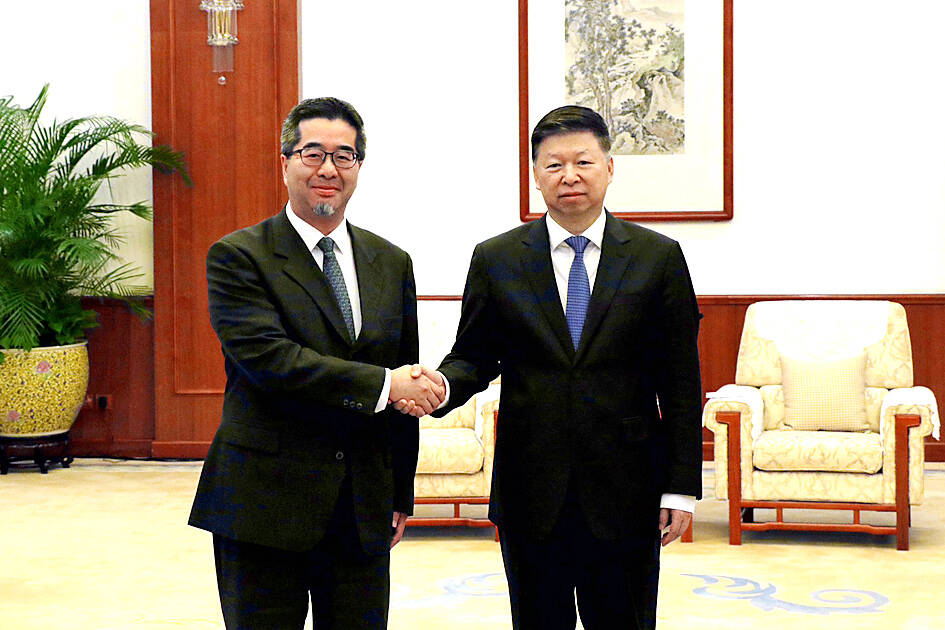The Democratic Progressive Party (DPP) yesterday accused the Chinese Nationalist Party (KMT) of complicity in Beijing’s campaign to subvert the nation, a day after incoming KMT vice chairman Hsiao Hsu-tsen (蕭旭岑) met with high-ranking communist officials in Tianjin, China.
Hsiao, who also heads the Ma Ying-jeou Foundation, told China’s Taiwan Affairs Office Director Song Tao (宋濤) that cross-strait relations are entering a “new stage” and that the KMT supports China’s so-called “unification” of Taiwan.
DPP spokesman Justin Wu (吳崢) cited senior KMT members as saying that Beijing had interfered in the party’s chairperson election to support Cheng Li-wun’s (鄭麗文) successful campaign for party leadership.

Photo courtesy of the Ma Ying-jeou Foundation
Cheng’s sending of a “senior KMT official” to grovel before Beijing even before assuming office on Saturday is an admission of the party’s complicity in a new phase of Beijing’s “united front” warfare against Taiwan, Wu said.
China has held celebrations of its so-called “Taiwan Retrocession Day” as the Chinese People’s Liberation Army stepped up its provocative activities around Taiwan, which have earned not condemnation, but praise from the KMT, he said.
In Tianjin, Hsiao said that surveys by several media outlets show that an overwhelming majority of Taiwanese support dialogue with China, while ignoring the preconditions that the public support for the nation to engage in talks with China, Wu said.
Only fully empowered officials can act as legitimate negotiators in cross-strait dialogues, he said, adding that the KMT’s unauthorized talks with communist officials have no legal standing.
Wu added that a recent poll showed that about 80 percent of Taiwanese believe Taiwan and China are not subordinate to each other, and an equal number reject Beijing’s “one China” principle, which asserts that Taiwan belongs to China.
The KMT’s lies are as shameless as they are futile, as they deceive no one but the party itself, he said.
The People’s Republic China should acknowledge the reality that the Republic of China in Taiwan is a sovereign and democratic nation, Wu said, adding that honest dialogue can begin only if Beijing gives up violence and threats against Taiwan.
Asked about the DPP’s comments, Hsiao said that “malicious comments by shameless DPP politicians” are not worth responding to.
Separately, Cheng yesterday said that Taiwan needs a “reasonable defense budget,” but added that “too high and unreasonable” military spending would exceed the nation’s financial capacity.
Taiwan “is not an ATM” and defense spending must not increase without limit or it would fuel “an endlessly escalating arms race,” she said.
Cheng reiterated her opposition to the DPP government’s plans to raise defense spending to 5 percent of GDP before 2030, which it said would boost deterrence against Chinese aggression.
Presidential Office spokeswoman Karen Kuo (郭雅慧) said the KMT chair-elect’s opinion was inconsistent with “democratic countries around the world.”
“Investing in national defense is investing in peace” and is intended to maintain Taiwan’s “free and democratic way of life,” Kuo said.
Cheng later told reporters that the Presidential Office “misread” her comments.
She said she firmly supports regional and cross-strait peace, but opposes any defense budget that “has no upper limit” or “creates a serious crowding-out effect” on public finances.
Taiwan should clearly tell the world that “we are peace-loving” and that the country’s “23 million people do not wish to create or provoke any regional conflict,” she said at a banquet at the Nantou County Council.
Additional reporting by Chen Cheng-yu and CNA

A small number of Taiwanese this year lost their citizenship rights after traveling in China and obtaining a one-time Chinese passport to cross the border into Russia, a source said today. The people signed up through Chinese travel agencies for tours of neighboring Russia with companies claiming they could obtain Russian visas and fast-track border clearance, the source said on condition of anonymity. The travelers were actually issued one-time-use Chinese passports, they said. Taiwanese are prohibited from holding a Chinese passport or household registration. If found to have a Chinese ID, they may lose their resident status under Article 9-1

Taiwanese were praised for their composure after a video filmed by Taiwanese tourists capturing the moment a magnitude 7.5 earthquake struck Japan’s Aomori Prefecture went viral on social media. The video shows a hotel room shaking violently amid Monday’s quake, with objects falling to the ground. Two Taiwanese began filming with their mobile phones, while two others held the sides of a TV to prevent it from falling. When the shaking stopped, the pair calmly took down the TV and laid it flat on a tatami mat, the video shows. The video also captured the group talking about the safety of their companions bathing

A classified Pentagon-produced, multiyear assessment — the Overmatch brief — highlighted unreported Chinese capabilities to destroy US military assets and identified US supply chain choke points, painting a disturbing picture of waning US military might, a New York Times editorial published on Monday said. US Secretary of Defense Pete Hegseth’s comments in November last year that “we lose every time” in Pentagon-conducted war games pitting the US against China further highlighted the uncertainty about the US’ capability to intervene in the event of a Chinese invasion of Taiwan. “It shows the Pentagon’s overreliance on expensive, vulnerable weapons as adversaries field cheap, technologically

Starting on Jan. 1, YouBike riders must have insurance to use the service, and a six-month trial of NT$5 coupons under certain conditions would be implemented to balance bike shortages, a joint statement from transportation departments across Taipei, New Taipei City and Taoyuan announced yesterday. The rental bike system operator said that coupons would be offered to riders to rent bikes from full stations, for riders who take out an electric-assisted bike from a full station, and for riders who return a bike to an empty station. All riders with YouBike accounts are automatically eligible for the program, and each membership account